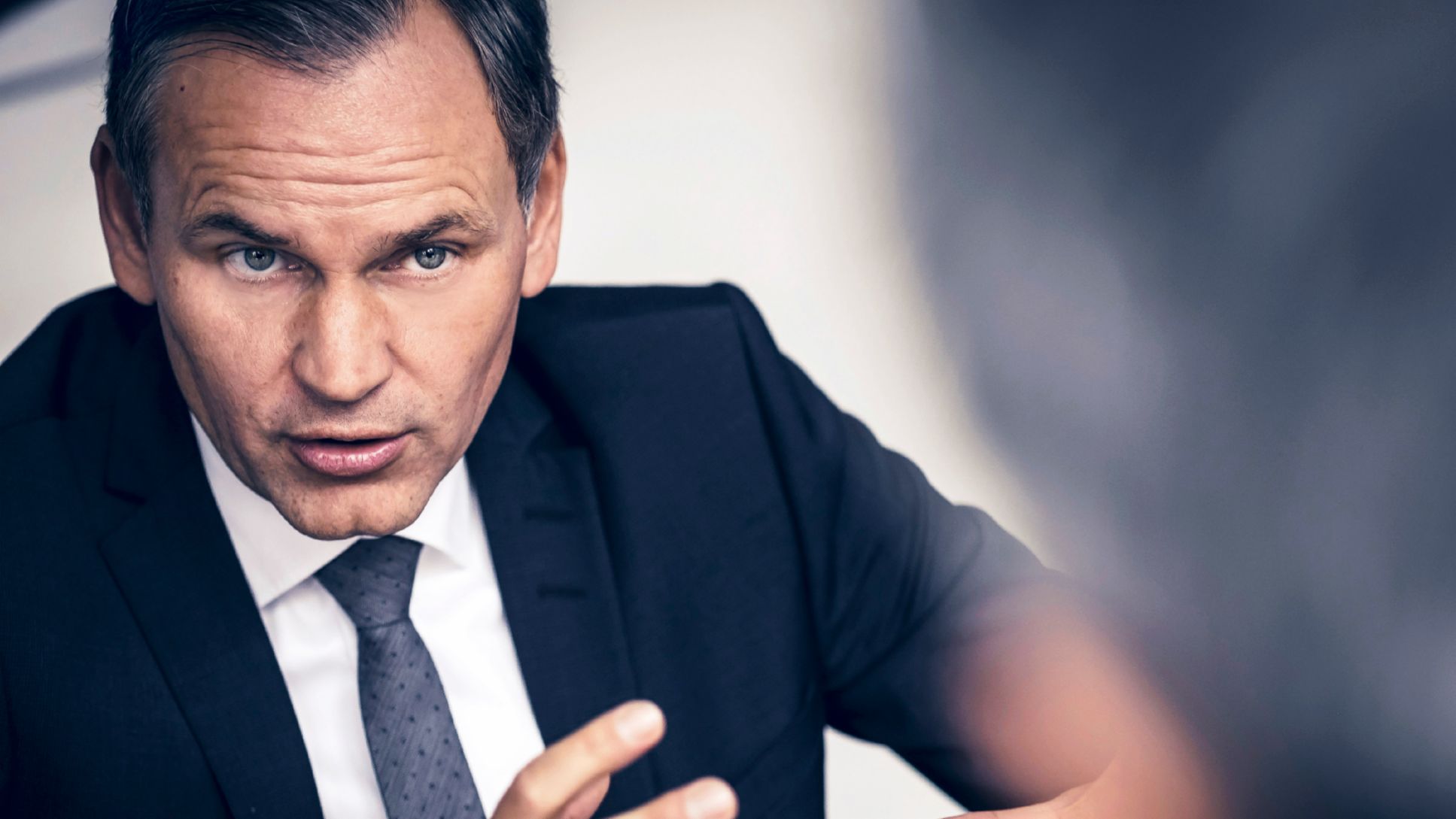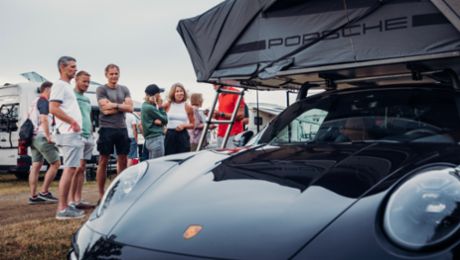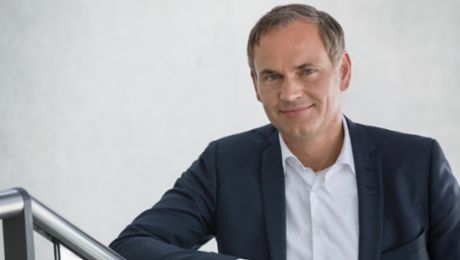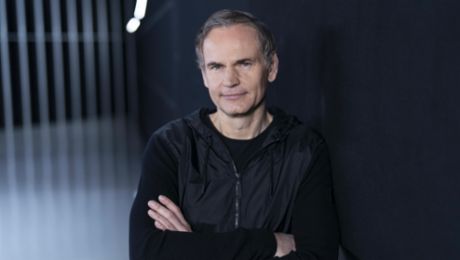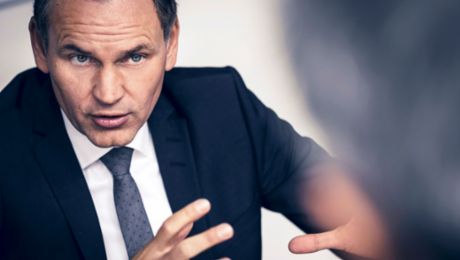Mr Blume, it has been a year since you were made Chairman of the Executive Board at Porsche. What do you miss most from life before your appointment?
“Miss” is perhaps the wrong word. My life has changed a great deal. In my previous role as member of the Executive Board responsible for Production and Logistics, I spent a lot of time in production departments in plants, standing directly at the production line. Nowadays, sadly, I have less time for that. That said, my product-related work is now much more comprehensive as it encompasses all aspects. In addition to my corporate management tasks, the work I do with regard to design and concepts is really important.
What changes have there been for you personally?
One thing in particular has definitely changed: I now have a much greater level of responsibility. The sheer range of tasks that my current day-to-day work involves means that I have to set clear priorities – and manage my time precisely. What’s more, I am now much more in the public eye. Nevertheless, I go about my life no differently now than I did previously – the time I spend with my family and friends is still extremely important to me. It has always been important for me to define myself as a person and not through my job role.
What is of particular importance to you as Porsche CEO?
First and foremost: people. People are at the heart of everything we do at Porsche. A good team can put anything into motion. However, a good team also needs strong leadership. Respect, trust, commitment and an open-minded approach – these are all characteristics that I have come to value. Another extremely important factor in my view is having a clear organisational structure with efficient processes that function effectively. And ultimately a strategy focused on the future with clear objectives and transparent milestones. And not forgetting a healthy dose of ambition to always strive for the best solution. These are all characteristics that define Porsche.
Looking back on the past year, what are the particular highlights that stand out for you?
It has been an extremely challenging time. I started out with an executive team that for the most part was completely new. The market launches of the 718 Boxster and 718 Cayman, the 911 R and the new Panamera have really caused a stir, as has the decision to put the “Mission E” into production. On the sports side, defending our title in the 24 Hours of Le Mans proved to be a highly emotional experience. And by unveiling the Porsche Strategy 2025, we have set the course for the decade to come. The founding of Digital GmbH in Ludwigsburg and the launch of our Digital Lab in Berlin are also among the key strategic decisions made.
What’s the outlook for Porsche?
There are a number of concrete opportunities for us – but we must be consistent in capitalising on these opportunities. We are currently having to perform a balancing act: Investing considerable sums in future products and new technologies while also safeguarding our high level of return over the long term. But I nevertheless remain confident: Over the coming years, we will continue to build on our corporate success and achieve moderate growth. Delighted customers, solid financial results and secure and attractive jobs are more important to us than unit sales.
What is Porsche’s position from a technological perspective and in terms of products?
Recent months have seen us launch a whole host of new products. And that is something that is set to continue over the coming years. As we have already demonstrated with the new Panamera, going forward we will place a greater emphasis on combining digital innovations and state-of-the-art drive concepts with sporty driving dynamics. And at the same time we will continue to delight fans of the brand by delivering classic, particularly purist sportscars.
The theme of Strategy 2025 is “The future of the sportscar”. What are the key focal points of this strategy?
At the heart of the strategy is our future product portfolio. The sportscar of the future will blend the history and values of Porsche with innovative technologies, while at the same time ensuring sustainability. In achieving this, topics such as electromobility, digitalisation and connectivity will play an important role. By tackling these issues, we will be making a key contribution to future mobility. But despite all these innovations and changes, one thing remains constant. Porsche is and will remain Porsche.
What features do you think will define “future mobility”?
We already know that the technological options available for and social demands placed on mobility are set to change considerably in the future. We are taking great care in preparing ourselves for this fact. For example, we are already starting to develop innovative services centred around the topic of mobility. Offering services of this nature will become increasingly important going forward. The same is true of autonomous driving. A Porsche will always be a car that you want to drive yourself. The emotive driving experience that is so typical of our brand is something that will always form the basis of our actions here at Porsche. Nevertheless, we will be offering our customers a number of functions as individual options in future. Porsche and autonomous driving are not a contradiction in terms. If the customer wants to make use of particular convenience features offered by autonomous driving, these functions can be a useful addition. Specific examples include the traffic jam pilot and ParkAssist. However, we also have a number of other ideas.
What opportunities do you see with regard to digitalisation?
For us, digitalisation is not an end in itself. However, we will use digitalisation in all areas where it enhances customer functions or makes processes easier. In doing so, we will concentrate on three core areas: Firstly, on our products and services; secondly, on our customers and trade, and thirdly on the company itself. However, people are always at the heart of what we do – be it a customer, business partner or employee. We will, therefore, not just guide people towards digitalisation without first considering how appropriate this is. In my view, success hinges to a considerable extent on whether digital technologies and processes are simple and intuitive to operate and use and whether they bring clear, recognisable benefits.
You head up the “Luxury/sport” brand group within the Volkswagen Group. What is the philosophy behind that group? And where do you see the potential?
Bringing the Porsche, Bentley and Bugatti brands together in a group offers numerous mutual benefits. Those benefits are clear as early as the development phase. Our new kits and modules form the basis for this development work. For example, the MSB platform developed by Porsche for the new Panamera will also be used by Bentley going forward. That creates real synergy effects and ultimately reduces costs. Nevertheless, the modular set-up of the platform still provides developers with sufficient flexibility to guarantee the specific driving experience expected of the relevant brand without compromise. What’s more, we can also make joint use of quality initiatives, production equipment, financial services and sales processes going forward. In terms of managing the brands, the requirement is as follows: The specific identities of the brands must be retained; as far as the customer is concerned, all three brands operate independently.
Your predecessor, Matthias Müller, is known for having revitalised the conventional Porsche philosophy. What would you like to be known for after one year as Chairman of the Executive Board?
I’d rather let other people decide that. I think of myself as a team player – one with the courage to redefine Porsche as requirements change. My aim is to carry the Porsche legacy into the future, in other words to combine the classic DNA of the sportscar with new technological possibilities. In going about this development, I can't escape the conclusion that it is all about people; that we need to interact with each other in a respectful way and that Porsche needs to take responsibility for society and the environment.
Consumption Data
911 R: Fuel consumption combined 13.3 l/100 km; CO2-emissions 308 g/km
718 Boxster: Fuel consumption combined 7.4 – 6.9 l/100 km; CO2-emissions 168 – 158 g/km
718 Cayman: Fuel consumption combined 7.4 – 6.9 l/100 km; CO2-emissions 168 – 158 g/km
